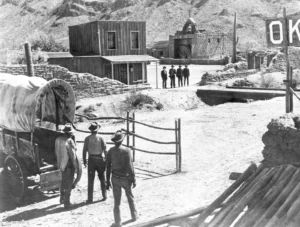Virginia Attorney General Jason Miyares recently announced on the nationally televised Laura Ingraham show that “there’s a new sheriff in town.” That new sheriff was gunned down Wednesday in the Senate Judiciary Committee.
The issue was Miyares’s marquee proposal to broaden the Attorney General’s authority to prosecute criminal cases in circuit court. As originally introduced by Senator Ryan McDougle (R-Hanover) the bill, SB 563, would have enabled sheriffs and police chiefs to request the Attorney General to prosecute cases involving specified violent crimes, without the concurrence of the local Commonwealth’s attorney.
As Miyares explained in an op-ed piece, the purpose of the bill was “inviting the Attorney General to prosecute child rape and violent crime cases whenever a local prosecutor … refuses to prosecute.” He focused on a horrific child sexual assault case in Fairfax County. Commonwealth’s attorney Steve Descano reached a plea agreement with the accused man in which the offender pled guilty and received a 17-year sentence. Miyares declared that “those who commit heinous crimes against children deserve to be prosecuted to the fullest extent allowed under the law.” In this case, a sentence of up to life was authorized under the law.
In his arguments for the proposal, Miyares made remarks that were misleading, if not downright false. He repeatedly accused Descano of refusing to prosecute the crime. The definition of “prosecute” is: “institute legal proceedings against.” To say that a prosecutor “refused” to prosecute implies that the accused person did not have to appear before a judge or jury, and was able to walk away. That certainly was not the case in this instance. The accused person went before a judge, entered a plea of guilty, and received a prison sentence of 17 years. He is now in prison. He was most definitely prosecuted. Furthermore, Miyares refers to “Commonwealth’s attorneys [who] make pre-determined decisions not to prosecute particular types of violent crime.” That is an outrageous accusation for which no proof or examples are offered.
In addition to making misleading statements, Miyares failed to mention the following aspects of the one child sexual assault case on which he was basing his argument:
- Descano’s predecessor had also offered a plea deal to this offender.
- The 17-year sentence was near the upper limit that would have been recommended by the state’s sentencing guidelines for a first offender. (This would have been the offender’s first conviction, thereby making him, in the eyes of the law, a first offender.)
- A jury in Nelson County last year handed down a 17-year sentence in a case involving crimes against a child similar to those in the Fairfax County case that Miyares was so upset about.
In his call for the legislation, Miyares referred repeatedly to “far-left” and “social justice” prosecutors. It was clear that his targets were Commonwealth’s attorneys recently elected in Northern Virginia. Perhaps he should have also looked closer to home. The Virginia Beach Commonwealth’s attorney recently took the following actions in cases involving violent offenses:
- Withdrew charges against a man accused of hiring a hit man to kill his wife, although the hit man had previously pled guilty;
- Reached a plea deal with an offender charged with sexual assault of a child, including sodomy.
Unless Commonwealth’s attorney Colin Stolle falls in the category of “far-left prosecutors,” Miyares’s campaign for the legislation seems motivated more by politics than by a desire to improve the criminal justice system.
Miyares likes to point out that he is a former prosecutor. As such, he well knows there are a lot of considerations that factor into a Commonwealth’s attorney’s decision not to prosecute or to enter into a plea agreement. Those considerations include the strength of the evidence, lack of witnesses, reluctant witnesses, and witnesses with questionable credibility. Miyares may know the details of the hand that Descano was holding in that child sexual assault case, but the public does not know them. Therefore, it is somewhat irresponsible to publicly second-guess another prosecutor.
There are several reasons why Miyares’s proposal is a bad one:
- Assistant attorney generals do not have a lot of experience trying major criminal cases.
- An assistant attorney general coming into a jurisdiction at the invitation of the sheriff or police chief would be at an immediate disadvantage. She would not be familiar with the case and the investigation surrounding it. She would not be familiar with the judge, the area, prospective jurors, or the investigative ability of local law enforcement.
- It would create tension between local law-enforcement and the local Commonwealth’s attorney.
- Sheriffs and police chiefs are not lawyers and thus are not usually in the best position to judge the strength of a case and whether it should go to trial. Therefore, they should not be allowed to second-guess the local prosecutor and invite in the Attorney General.
By the time the bill came up in committee, Miyares had already backed down considerably in the face of strong resistance by the Virginia Association of Commonwealth’s Attorneys, which holds considerable influence in the General Assembly. He offered a substitute bill that would add child sex crimes to a list of offenses which his office can directly prosecute. The committee did not go along with that, either. It killed the bill on an 8-7 vote, with Chap Petersen (Fairfax) the only Democrat to join all the committee’s Republican members in support of the bill.
There is a House companion, HB 1198 (Bell-R, Albemarle). Miyares seems to be hoping that he can persuade one more Democrat on the Senate committee to support the bill by the time it reaches the Senate.
My Soapbox
Miyares is not a sheriff. To be fair to Miyares, most candidates running for the office of Attorney General frame their campaigns around being the state’s “chief law enforcement officer.” The Attorney General and his assistants are not law enforcement officers. They cannot arrest anyone. In the Code section generally relied upon for a definition of “law enforcement officer,” the Attorney General is nowhere included in the list of individuals who can be considered law enforcement officers. The only individual who could credibly be considered the “Commonwealth’s chief law enforcement officer” would be the State Superintendent of State Police, but even he has no authority over the hundreds of local sheriffs, deputies, police chiefs, and police officers throughout the state.
The Attorney General is head of the Commonwealth’s law firm. The office has authority to prosecute a limited list of criminal offences, with most of them being at the request of the local Commonwealth’s attorney. The main functions of the Attorney General’s office include the following:
- Providing legal advice to the Governor and state agencies;
- Representing the Commonwealth and its agencies in court on civil matters;
- Rendering opinions on legal issues at the request of state and local officials;
- Representing the state in large multi-state suits involving recovery of damages, such as the tobacco and opioid cases; and
- Investigating, prosecuting, and recovering damages in Medicaid fraud cases.
Rather than engaging in politically-charged campaigns, Miyares would be better off turning his attention to an area that Jim Sherlock, the chief champion of Miyares on this blog, has frequently criticized Miyares’s predecessor of neglecting: antitrust investigation of Sentara. That sort of activity won’t rate you an appearance on the Laura Ingraham show, but it could very well benefit Virginians.


Leave a Reply
You must be logged in to post a comment.